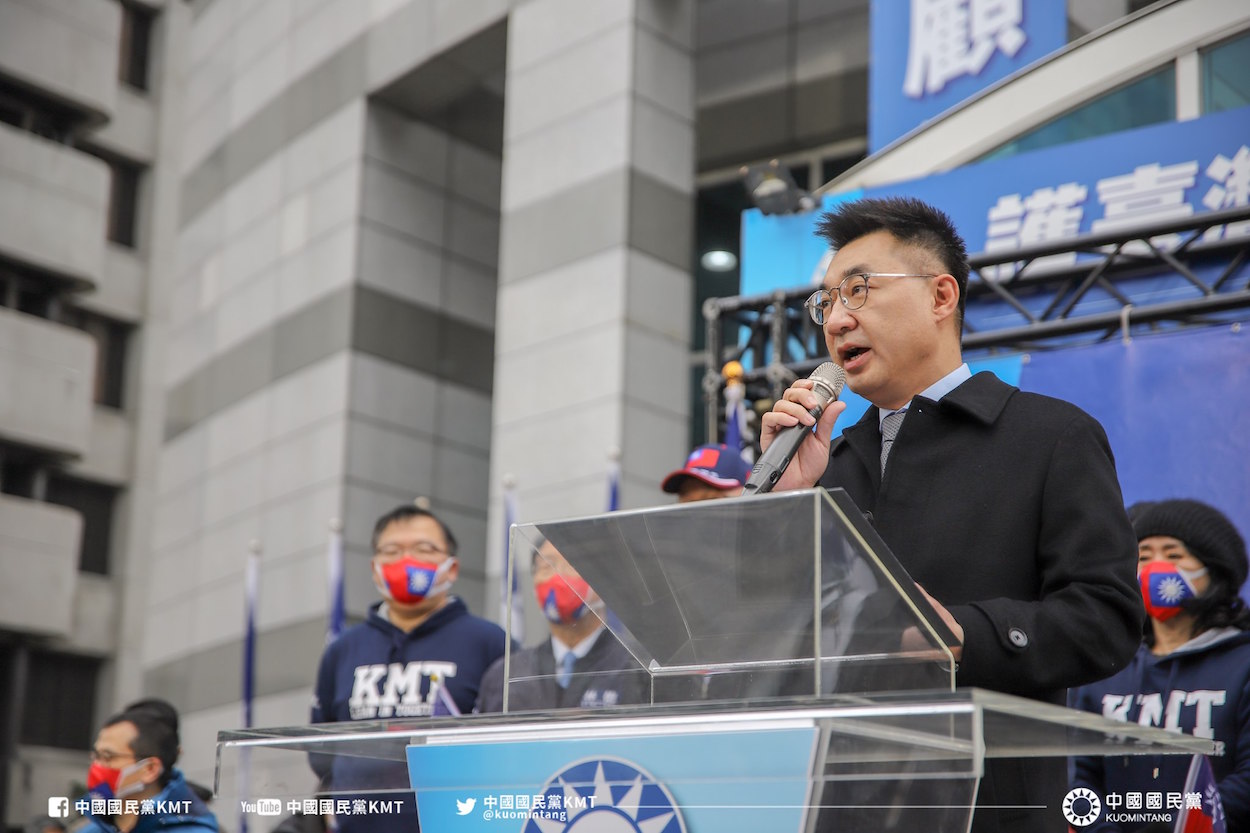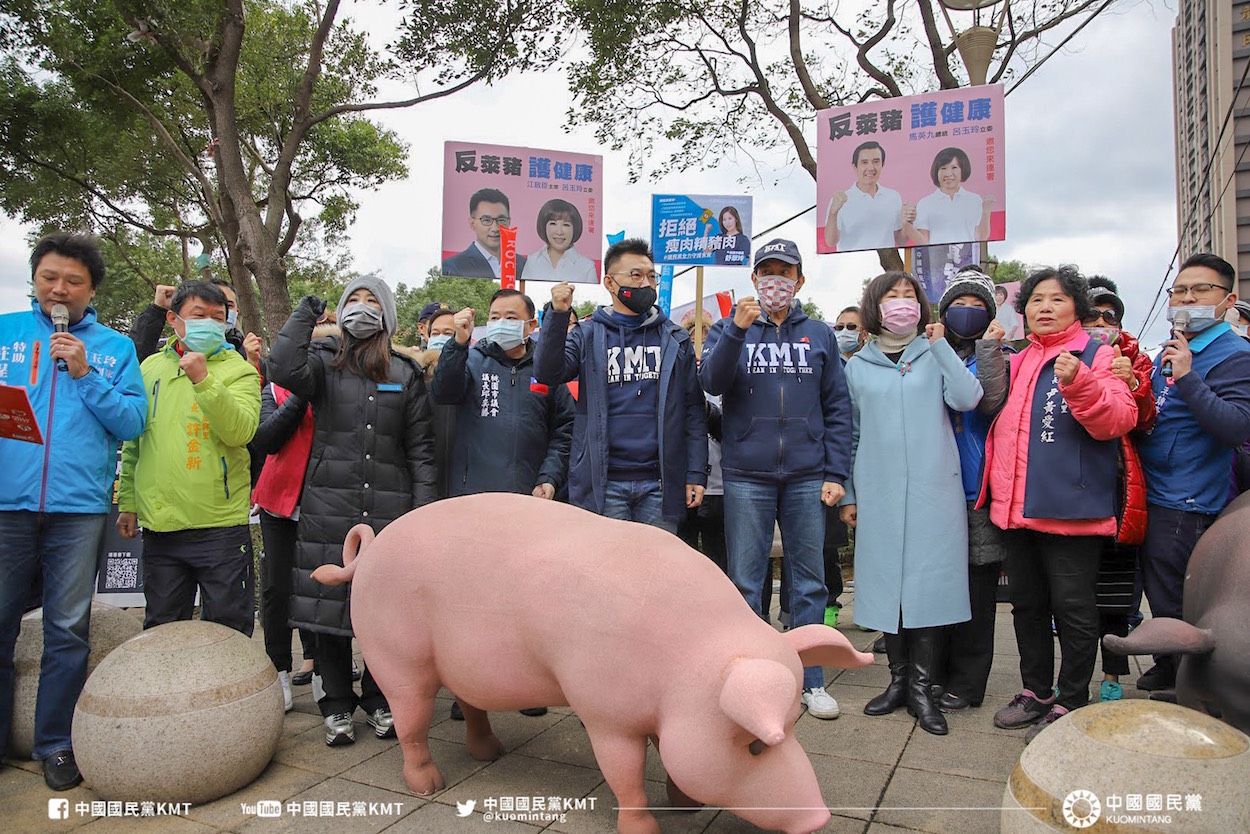by Brian Hioe
語言:
English
Photo Credit: KMT/Facebook
THE ISSUE OF ractopamine-treated pork imports continues to be a contested one in Taiwan. The Tsai administration made moves to lift limits on imports of pork treated with ractopamine from the US in September, with the aim of securing a bilateral trade agreement (BTA) between Taiwan and the US.
Limits on imports of pork treated with ractopamine have long been a contested issue in Taiwan, seeing as there has long been public concern regarding ractopamine’s effects on food safety. However, restrictions on US pork and beef imports to Taiwan have long been seen as an impediment to signing a BTA between the US and Taiwan.
Although the DPP aims to sign such an agreement in order to strengthen the economic incentive for America to defend Taiwan against the threat of Chinese invasion, past KMT administrations have also sought to remove the limits on imports of US pork and beef. To this extent, the DPP and KMT have effectively traded positions on the issue of US pork between when they were in office and served as the opposition.
 KMT chair Johnny Chiang. Photo credit: KMT/Facebook
KMT chair Johnny Chiang. Photo credit: KMT/Facebook
With the KMT presently aiming to organize a referendum to overturn the DPP’s lifting of the limits on US pork imports, the KMT is likely hoping to throw a wrench into the DPP’s aim of signing a BTA with the US. The KMT may perceive its electoral successes in 2018 elections as linked to its simultaneously leveraging on issues put up for national referendum, ranging from the use of nuclear energy in Taiwan to the legalization of gay marriage, and may hope for a repeat performance. One also notes that the US has long been wary of the potential for Taiwan’s national referendum system to unexpectedly disrupt its policy aims in the region, particularly if the referendum were used as a means of pushing for Taiwanese independence.
The KMT began collecting signatures in mid-December, after its petition to hold a referendum was approved by the Central Election Commission. The KMT will need to collect 290,000 signatures within six months for its referendum to advance, though the party has stated that it hopes to collect 600,000 signatures in two months.
That being said, changes made by the DPP to Referendum Act in July 2019 separated the date that elections are held on from the date that national referendums are held on, with the aim of preventing referendum campaigns from being used by the KMT to boost its electoral campaigns. It remains to be seen how successful the KMT will be in its push for a referendum on the issue of ractopamine pork.
Because of its successes in 2018 local elections, the KMT controls a number of cities and municipalities. As a result, it was predictable that local governments sought to challenge the central government to try and defy its lifting of limits on ractopamine-treated meat imports, enacting local bans on meat with traces of ractopamine. The central government voided these ordinances earlier this month, stating that this was necessary for there to prevent chaos.
Instead, to stave off attacks by the KMT, the DPP has sought to adopt an attitude of transparency. A new certification system from the Council of Agriculture allows local businesses to apply for a label that shows that they use Taiwanese pork, rather than American pork or pork from other countries. The government has also launched a new website showing the volume of daily pork imports into Taiwan by country. Otherwise, many businesses have taken to displaying signs stating the country of origin of their pork.
The new certification system may allay concerns from Taiwanese pork farmers that the entrance of American pork will negatively affect their businesses, seeing as businesses largely do use Taiwanese pork, rather than pork from other countries. That being said, some concerns have taken place regarding the mislabeling of pork products as being of Taiwanese origin in major chains such as Formosa Chang. Consequently, this has led fines for mislabeling pork products to be steepened to between 40,000 NT and four million NT. Nevertheless, the KMT has accused the DPP of falsely depicting pork products as free of ractopamine.
 Photo credit: KMT/Facebook
Photo credit: KMT/Facebook
It is to be seen whether the American pork industry takes issue with Taiwan’s pork labeling system, perhaps viewing the Taiwanese government’s actions as damaging to principles of free and equal competition and protectionist in nature, in acting to defend the Taiwanese pork industry. This could potentially disrupt trade talks for a BTA between Taiwan and America.
Either way, one expects the KMT and members of the pan-Blue camp to continue with efforts to depict ractopamine-treated pork products as dangerous to the health of Taiwanese. In past months, this has included outright disinformation, such as claiming that ractopamine-treated pork is more toxic than drugs such as MDMA.

